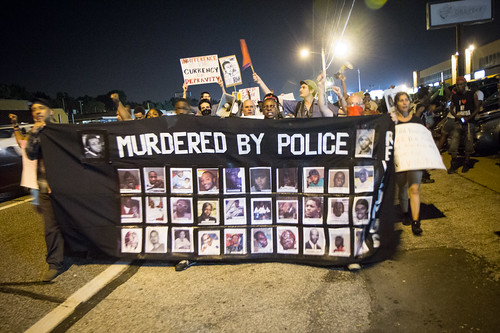Covering the Three Missouri Michaels
What did we learn about America as the media covered three young Black men in Missouri—an NFL recruit, an HIV-positive alleged sex offender, and a teenager killed by a cop?

In this country, Black bodies have long been commodified and controlled, and as I headed to Missouri for the second time in 2014, I realized not much had changed here. I was on assignment, first for BuzzFeed, then for the Guardian, to study three Missouri Michaels: Michael Johnson, Michael Sam, and Michael Brown. The first, better known as “Tiger Mandingo,” was incarcerated; the second, Michael Sam, had the nation captivated as he entered the NFL draft as an openly gay man; the third, Michael Brown, was dead. He’d been shot, infamously, by the Ferguson police.
I was in a detention center in St. Charles, Missouri last Spring to interview detainee Michael Johnson, an HIV positive 22-year-old former college student wrestler who had been arrested the previous October on charges that he had knowingly exposed five people to the virus. By the time he faces trial in 2015, he will have been waiting in jail for 18 months. Like everywhere in America, this jail was disproportionately full of African Americans, even though they are a small fraction of St. Charles’ general population, a white flight suburb of St. Louis which is more lopsidedly white than its more famous suburban cousin, Ferguson, is Black.
The very next day in St. Louis I reported on Michael Sam, the 24-year-old gay college football player who had come out recently while playing for the University of Missouri, being recruited to the Rams. The differences between America’s interest in these two Black, gay college athletes was immediate and obvious: there was lots of money to be made off of Michael Sam, and none to be made off Michael Johnson. Hence, celebration and tremendous interest in the former for being successful, handsome and on his way to being rich, and disgust lobbed at the latter for being “sick” with HIV, illiterate and just another “mandingo” behind bars.
But the Michael dialectic changed when I returned to Missouri for the Guardian just three months later to cover my third Michael, during the aftermath of the shooting of Michael Brown, the unarmed 18-year-old shot by Ferguson Police Officer Darren Wilson. Their stories overlapped in various ways. Michaels Sam and Johnson were both gay and athletes; Michaels Johnson and Brown both struggled to get into lowly regarded colleges; and while Michael Johnson the alleged sex predator was largely forgotten once he was locked up, Michaels Sam and Brown have become symbols for the causes of gay visibility and police violence, respectively, which far supersede their individual stories.
A common trait all three Michaels shared: for a reporter, each was incredibly difficult to talk to. Even though Michael Johnson wanted to talk to me, I had to fly 1,000 miles, show up at his jail, and demand a meeting in person with his controllers, with no guarantee it would happen. (We were granted an hour to speak to each other, the last day of my trip.) Meanwhile, Michael Sam came out as gay through an incredibly scripted public relations campaign. The Rams would not let me talk to him, or even to a teammate who wanted to speak with me, when he was drafted.
And Michael Brown, of course, was dead—unavailable to speak to anyone. (Michael Johnson left an exhaustive social media archive to speak for him on the web, while Michael Brown did not.)
Each Michael’s story was unique, of course. Michael Sam was the epitome of the success story that dominates narratives about lesbian, gay, bisexual and transgender Americans in current media. These stories are embraced by LGBT groups, which champion people like Sam and make money of their tales. But as a reporter, Sam’s story was frustrating and boring. It was sold, with the help of two agents, exclusively to one outlet. No other reporter was really able to talk to him after that, but his savvy was handsomely rewarded. Before he had even been drafted, Sam was offered an endorsement from Visa, Oprah wanted to make a series on him, and ESPN covered his draft on live TV. Kissing his white boyfriend raised only a blip of controversy, and Sam was “welcomed with open arms” by the mayor and people of St. Louis. (Though the Rams, welcoming at first, cut him. Then the Dallas Cowboys quickly signed him, only to release him a couple of months later. Sam later told GQ, “If I had it my way, I never would have done it the way I did, never would have told it the way I did.”)
Michael Johnson’s story was very different. He was a star wrestler, but there wasn’t real money to be made off of him other than in college wrestling. He was arrested and charged with one count of recklessly infecting a sexual partner with HIV and four counts of attempting to recklessly infect others with HIV. (Lindenwood University admitted him even though he seems to be illiterate, then expelled him the day he was arrested and before he was even tried, let alone convicted, of anything.) Johnson’s white sexual partners and “Tiger Mandingo” nickname branded him a sexual predator in both traditional and social media. Yet while Johnson’s arrest went internationally viral, media interest peaked before the complicated story was understood. Reporters repeated prosecutor’s talking points with no reporting, and untrue “facts” were repeated and retweeted. I was the only journalist to visit Johnson in jail and actually talk to him.
And, despite their stakes in HIV, not a single Black, civil liberties, or LGBT rights group took an interest in his case. The NAACP, the ACLU and the Human Rights Campaign prefer heroes that kids (and, more importantly, donors) can relate to. They’ve little interest in defending an unsympathetic character like Michael Johnson.
Finally, as a dead person, Michael Brown fit a different role. He filled a major archetype we have become all too familiar with in American media (the gunned down Black teenager) and a subcategory of it (the unarmed young Black man killed by a cop or “paracop,” like Trayvon Martin, Jordan Davis, or John Crawford). But as a ghost, he is also tabula rasa: Brown can fill whatever archetype Americans and American media want to project onto him. To people like me, that meant seeing Brown as yet another dead Black child engaged with the “ultimate defense,” where he had to prove his right to life from beyond the grave. To the New York Times, that meant Brown was “no angel”. To Fox News, it meant that “race hustlers” prematurely decided “Officer Wilson is already guilty,” with habeas corpus granted the shooter and not the shot Brown, who must have done something to deserve it.
There is one last thing that binds all three of these Michaels: they did not control their own bodies. The respective bodies of Michaels Sam, Johnson and Brown were controlled last year by corporation, incarceration, and state sponsored extermination. Michael Sam’s body was largely controlled by the NFL, a tax-exempt private corporation which takes in billions a year, which is subsidized by all Americans, and which profits greatly from athletic Black bodies. Michael Johnson’s body was controlled by Lindenwood University, until the state took control of if it and Lindenwood walked away from its claim on the problematic Negro; Johnson’s bodily commodity now earns money for the Missouri Department of Corrections.
And with Brown, the state simply executed our third and final Michael, dispensing with a trial. Through Officer Wilson, now a free man facing no charges, the state of Missouri took control of Michael’s body, shot it, saw no value in expending the cost of an ambulance to resuscitate it, and disposed of it.
Steven W. Thrasher is in the American Studies program at New York University and a weekly columnist for the Guardian. In 2012, he was named Journalist of the Year by the National Gay and Lesbian Journalists Association.

Comments 6
Don’t Black Lives Matter? » Feminist Reflections
December 11, 2014[…] Covering the Three Missouri Michaels by Steven Thrasher, Nov. 26, 2014. […]
jackssmsth
January 15, 2020hank you so much for this. I was in https://kodi.software/ to this issue and tired to tinker around to check if its possible but couldnt get it done. Now that i have seen the way you did it, thanks guys
with
regards
msiles smsithd
January 15, 2020hank you so much for this. I was into t kodi.software his issue and tired to tinker around to check if its possible but couldnt get it done. Now that i have seen the way you did it, thanks guys
with
regards
msiles smsithd
January 15, 2020Thdcanks for sharing.I found a lot of inte plex.software resting information here. A really good post, very thankful and hopdsceful that you will write many more posts like this one.
kickmotu
September 14, 2020Gaming is fun and an activity that involves people from every walk of life. It works perfectly well in uniting people, even those living in different parts of the world through online gaming. Although not all games can be played online, you can still enjoy a perfect moment with your friends during your free time.
brawl stars hack version apk
Daniel E. Nash
September 30, 2020Much obliged to you for sharing this help number if the blockchain with us that will help us in exchanging. I acknowledge for imparting this data to us but I can check 123helpme review to manage the task. To get the large number of advantages through it attempt to remain associated with this blog.